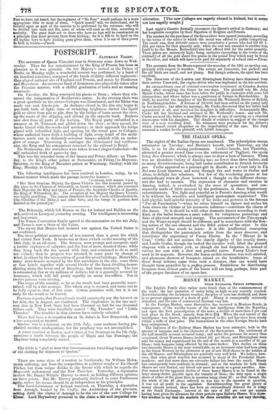THE ITALIAN OPERA.
The nights of the Italian Opera are numbered. The subscription season terminates on Tuesday; and Moriani's benefit, next Thursday, say the bills, is to be the closing performanoe. Cerito's benefit, last Thursday, attracted a greater crowd than even the retirement of Taglioni; the opera being Don Giovanni, which is always sure to draw a host of listeners. There was an abundant variety of dancing too; no fewer than three ballets, and as many divertissements, being laid under contribution to furnish favourite pas. Cerito appeared as a peasant-girl in .Rosida, as a Court lady in Um Bal sous Louis Quatorze, and went through fire and water in &dine and Alma, to delight her admirers. Yet few of the wondering gazers at her extraordinary tours de force bestowed a thought on the different charac- ters she had to assume. The expression of character and emotion in dancing, indeed, is overlooked by the mass of spectators; and con- sequently made of little account by the performers, in these fragmentary entertainments. Yet, light and graceful as is Perrot's dancing,what would it be without his sensitive and intelligent pantomimic expression? The half-playful, half-spiteful intensity of his looks and gestures in the famous "Pas de Fascination "—when he raises himself on tiptoes and arches his form above the victims of his mesmeric influence—constitute the charm of the dance. So it should be with other dramatic dances according to their kind, or the ballet becomes a mere vehicle for voluptuous posturings and feats of physical strength and energy. The movements of the Fire-nymph and the Water-nymph should be different, and in accordance with the flow- ing action of the one element and the fitful ardour of the other. In this respect Cerito has much to learn: it is this intellectual conception that distinguishes the pantomimic artiste from the mere danseuse, and constitutes the supremacy of Fanny Elssler. In the "Minuet de la Cour," Cerito did not assume the stately dignity of the courtly dame; and Lucile Gmhn, though she looked the cavalier well, lifted the plumed chapeau with a sudden jerk, as though she had forgotten it, instead of raising her arm with a slow and graceful curve. Fanny Elssler's bow used to be majestic. However, the house on this occasion was well satisfied, and plenteous showers of bouquets rained on the bdneficiaire. Some of these floral tributes came from such a distance, that one would have thought them propelled by a puffing process. Battledores for distributing bouquets from distant parts of the house will ere long, perhaps, form part of the proper furniture of an opera-box


























 Previous page
Previous page